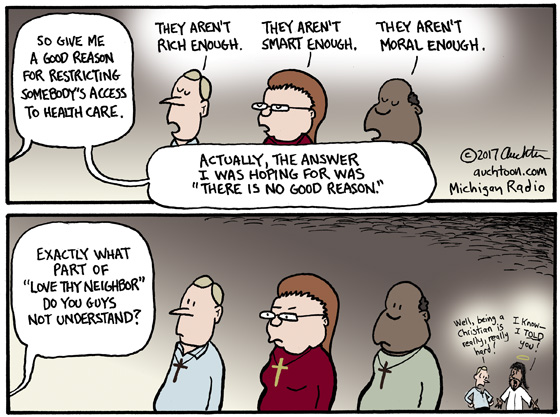What’s a Good Reason to Restrict Access to Health Care?
This week’s cartoon is an open question to my fellow Christians. It’s not intended to exclude non-Christians — you’re certainly welcome to ponder it, too. It’s just that I’ve never committed myself to a non-Christian faith or philosophy, so I wouldn’t presume to have the qualifications. Whereas I’ve been an active, practicing Roman Catholic all my life.
“Practicing” being the key word here. I’ve been at it a long time, but can’t say that I’ve got it right. The best evaluation I could hope for at any given performance review would be “does not meet expectations.” So I ask not from a position of “holier than thou,” but from a genuine confusion in trying to reconcile the teachings of Jesus Christ with American health care policy.
Obviously my question is easily traced to the ongoing chaos playing out in Washington DC. Watching the Congress grapple with health care these past few months feels like a live theater production of the Book of Revelations (except Revelations is more whimsical and easier to understand).
But what really tripped it off was State Senator Rick Jones submitting a bill to eliminate health insurance benefits for domestic partners for state employees.
In the context of our current system, it seems sensible enough. Jones wants to save the state some money. Why don’t these people just get married? Well, here are a couple of things:
There are rules in place to limit if not eliminate gaming the system — couples must prove they are in fact domestic partners. And the money saved (a million annual dollars) is relatively minor, especially if you consider that it is going to provide health care for real, actual people.
But it’s his awkward attempt at being hip with the kids (“put a ring on it”) that exposes the undercurrent. Two years ago Jones floated the same bill in the hopes of eliminating health care benefits to same-sex couples. This isn’t about saving money; this is about enforcing moral superiority.
The idea of meting out basic human health care based on a person’s wealth, intelligence, or morality is simply not Christ-like. I mean, what’s next? Kicking transgender people out of the military because of their supposed potential for health care expense?
Wait…






